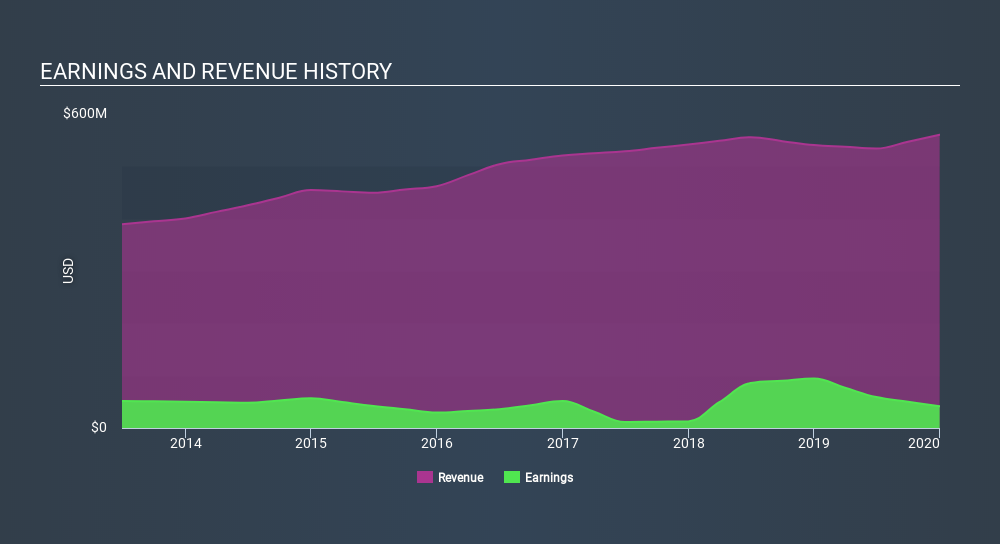- United Kingdom
- /
- Hospitality
- /
- LSE:EVOK
Here's Why 888 Holdings's (LON:888) Statutory Earnings Are Arguably Too Conservative
Statistically speaking, it is less risky to invest in profitable companies than in unprofitable ones. However, sometimes companies receive a one-off boost (or reduction) to their profit, and it's not always clear whether statutory profits are a good guide, going forward. This article will consider whether 888 Holdings's (LON:888) statutory profits are a good guide to its underlying earnings.
It's good to see that over the last twelve months 888 Holdings made a profit of US$41.6m on revenue of US$560.3m. While it managed to grow its revenue over the last three years, its profit has moved in the other direction, as you can see in the chart below.
See our latest analysis for 888 Holdings

Importantly, statutory profits are not always the best tool for understanding a company's true earnings power, so it's well worth examining profits in a little more detail. So today we'll look at what 888 Holdings's cashflow tells us about the quality of its earnings. That might leave you wondering what analysts are forecasting in terms of future profitability. Luckily, you can click here to see an interactive graph depicting future profitability, based on their estimates.
A Closer Look At 888 Holdings's Earnings
As finance nerds would already know, the accrual ratio from cashflow is a key measure for assessing how well a company's free cash flow (FCF) matches its profit. In plain english, this ratio subtracts FCF from net profit, and divides that number by the company's average operating assets over that period. The ratio shows us how much a company's profit exceeds its FCF.
Therefore, it's actually considered a good thing when a company has a negative accrual ratio, but a bad thing if its accrual ratio is positive. That is not intended to imply we should worry about a positive accrual ratio, but it's worth noting where the accrual ratio is rather high. That's because some academic studies have suggested that high accruals ratios tend to lead to lower profit or less profit growth.
888 Holdings has an accrual ratio of -0.31 for the year to December 2019. Therefore, its statutory earnings were very significantly less than its free cashflow. To wit, it produced free cash flow of US$59m during the period, dwarfing its reported profit of US$41.6m. 888 Holdings shareholders are no doubt pleased that free cash flow improved over the last twelve months.
Our Take On 888 Holdings's Profit Performance
As we discussed above, 888 Holdings's accrual ratio indicates strong conversion of profit to free cash flow, which is a positive for the company. Based on this observation, we consider it possible that 888 Holdings's statutory profit actually understates its earnings potential! On the other hand, its EPS actually shrunk in the last twelve months. At the end of the day, it's essential to consider more than just the factors above, if you want to understand the company properly. With this in mind, we wouldn't consider investing in a stock unless we had a thorough understanding of the risks. Every company has risks, and we've spotted 3 warning signs for 888 Holdings you should know about.
This note has only looked at a single factor that sheds light on the nature of 888 Holdings's profit. But there is always more to discover if you are capable of focussing your mind on minutiae. For example, many people consider a high return on equity as an indication of favorable business economics, while others like to 'follow the money' and search out stocks that insiders are buying. So you may wish to see this free collection of companies boasting high return on equity, or this list of stocks that insiders are buying.
Love or hate this article? Concerned about the content? Get in touch with us directly. Alternatively, email editorial-team@simplywallst.com.
This article by Simply Wall St is general in nature. It does not constitute a recommendation to buy or sell any stock, and does not take account of your objectives, or your financial situation. We aim to bring you long-term focused analysis driven by fundamental data. Note that our analysis may not factor in the latest price-sensitive company announcements or qualitative material. Simply Wall St has no position in any stocks mentioned. Thank you for reading.
About LSE:EVOK
Evoke
Operates as a betting and gaming company in the United Kingdom, Italy, Spain, Romania, Denmark, and internationally.
Very undervalued with high growth potential.
Similar Companies
Market Insights
Community Narratives



